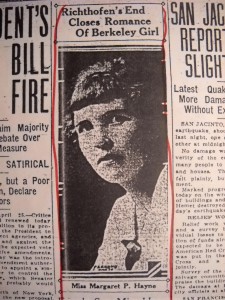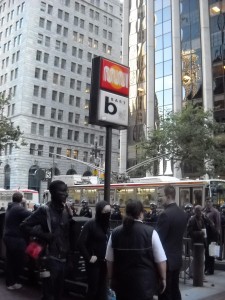
Is there a link between the two?

The Chronicle saw a link
There are multiple bits of local lore and history that residents of Berkeley CA might find interesting, but that doesn’t mean that stumbling onto one of these obscure facts from the past will provide a columnist with a topic to use online because folks in other parts of the world might not be concerned with the hundred year old social life of a UC Berkeley graduate who went on to a teaching career in Oakland.
Would there be a world wide audience interested in her if further investigation revealed that after Manfred von Richthofen (AKA the Red Barron) was shot down, on April 21, 1918, during World War I, a reporter from the San Francisco Chronicle sought out Miss Margaret P. Hayne and asked her if she had been engaged to him?
After noting that she denied that, a story in the Chronicle went on to report that “her friends believed that there was an understanding between the brilliant German aviator and the Berkeley girl.”
She was quoted as saying “I knew him very well, that is all.” She went on to explain that she knew his mother, brothers and sisters and that “ . . . a close friendship existed between myself and the family.”
The story informed readers that Ms. Hayne had graduated from UC Berkeley in 1903, passed the bar exam, and that she had had a law office in San Francisco before beginning her teaching career in Oakland. Was calling a woman approximately 35 years old “a girl” an early example of “spin”?
On Saturday, January 14, 2012, the World’s Laziest Journalist went on a topic safari to San Francisco. At the once-a-month warehouse sale held by the Friends of the San Francisco Public Library, we bought two book to be read with an eye for column topics, but we had also purchased William E. Burrows’ book, “Richthofen: A True History of the Red Baron” just to read for personal pleasure.
That nigh, when we opened up the 1969 book from Harcourt, Brace, and World Inc., while looking for the end-paper map, we noticed that a standard 8 ½ by 11 sheet of paper had been folded in half and tucked behind the back flap of the dust jacket.
We expected to find a review of the book at hand, but when we unfolded the paper it appeared to be a 100% size Xerox copy of the front page of a much older newspaper.
A story about Miss Margaret Hayne was circled in red.
Since a portion of the image identifies the San Francisco Chronicle as the source and sine it makes reference to the fact that Captain Baron von Richthofen had been shot down the week before, it would be relatively simple to track down the exact date of publication.
If we went to the San Francisco Public Library it would probably require just another hour or two of library research to ascertain that information and perhaps provide the basis for sending a feature story query letter to a magazine that appeals to an audience of aviation enthusiasts.
A quick online search revealed that the Red Baron was killed on the 21st of April in 1918, which was just a few days after the United States marked the first full year of participation in the War to end all Wars. Congress had declared war on April 6, 1917 because of a torpedo attack on the passenger liner Lusitania. Conspiracy theory lunatics have challenged the veracity of the official accounts of the incident ever since.
The alternative would be to put the information into the less scholarly form of a loopy column and skip over the need for extensive academic research.
Information that had been previously published several decades ago won’t qualify the column as a “scoop,” but a few Google searches indicated that a column about Ms. Hayne and the Red Baron would provide some information online that hasn’t previously been easily accessible for the curious readers on the Internets.
At the same time and place that we bought the Red Baron book, we had also purchased a mint condition copy of a 2003 Barnes and Noble paperback edition of Upton Sinclair’s “The Jungle,” with introduction and notes by Maura Spiegel. It was obvious from the blurbs on the back cover that if the columnist reads that book another column about how the exploitation of workers by the wealthy Chicago meatpacking company owners would write itself. Sinclair called the area Packingtown.
The headline “Occupy the Jungle” would help draw today’s readers into a review with comments about the 100 year old novel.
When “The Jungle” was published it spurred President Theodore Roosevelt into action and another of its effects, according to the Introduction by Maura Spiegel, “was shinning a bright light on the ever-darkening realms of child labor, prisons, insurance companies, and foremost, American enterprise and its role in the creation of a new American class of impoverished industrial wage slaves.” Isn’t the pendulum swinging back towards the sanctioning of child labor once again?
Some Republicans are hinting that such a move could benefit the United States in two ways: it would eliminate the need to spend tax dollars on school improvements and it would provide families with extra income.
Could Mitt Romney use Upton Sinclair’s “The Jungle” to assert that he will fight to reestablish the sacred American tradition of exploiting poor workers to help him get himself get elected as President?
Earlier in the week, the columnist had bought a copy of “Gödel, Escher, Bach: An Eternal Golden Braid,” and learned about the concept of “Strange Loops.” According to the Author, Douglas R. Hofstadter: “The ‘Strange Loop’ phenomenon occurs whenever, by moving upwards (or downwards) through the levels of some hierarchical system, we unexpectedly find ourselves right back where we started.”
If the Occupy Movement is fighting the same injustices that caused Upton Sinclair to write his best selling rant more than a hundred years ago, does that mean it is time for Hofstadter to revise his book with more examples of contemporary culture’s modern flashbacks to the past?
Hofstadter maintains that many of M. C. Escher’s most famous drawings are images that embody the Strange Loop concept.
Would it surprise Hofstadter if the Republicans select JEB Bush as their Presidential candidate or would he merely shrug it off saying that it was just another example of the Strange Loop?
About two blocks away from the book sale and about two hours after we bought the books, Occupy San Francisco made the news with some protest activity at a nearby branch of the Wells Fargo Bank. We missed the chance to cover that chapter of the history of the Occupy Movement, but thanks to the material we gathered leading to information about a Berkeley student, the WWI ace, and the muckraking journalist, we would classify our topic safari to San Francisco as a success.
Ms. Hayne provided this column’s closing quote when she gave her assessment of von Richthofen to the Chronicle’s reporter: “He was a fine man.” We concur. Wasn’t respect for a warrior from the other side considered a proper manifestation of the chivalry code of conduct?
Now the disk jockey (can you see it coming a mile away?) will play The Royal Guardsmen’s “Snoopy Vs. The Red Baron,” the Guns and Roses’ song “Welcome to the Jungle,” and as a farewell tribute to a fellow whose formative years were spent in Berkeley, Johnny Otis’ “Willie and the Hand Jive.” We have to go check the show times for the new movie titled “Red Tails.” Have a “I don’t want to send those men up there in machines held together with bailing wire and chewing gum – but I must!” type week.








“Hello, sucker!”
Any man who hates small dogs and children can’t be all bad.
There is a sequence in a W. C. Fields movie (If memory servers, that would be “Never give a sucker an even break”) that shows a con man with a funny name (Fields) at a coffee shop lunch counter chatting up the fellow next to him. The rapscallion makes his move and says to the victim: “It’s been a pleasure talking to you; I think I’ll buy your lunch. When I get up to the cashier, I’ll tell her to charge me for your lunch, so you raise your hand when I point in this direction.” Then when he talks to the young hostess with access to the cash register, he says: “The fellow next to me offered to buy my lunch. It’s that guy.” He points to the gullible fellow, who raises his hand. Fields marches off in triumph leaving the film audience in hysterics.
All this esoteric film history would be relevant if we were trying to land a gig as the intern at the British film review website Cinesthesiac, if they ever expand their staff to include that position. However, since this column is going to be posted on sites that relish mordacious political punditry, we had better hasten to add that this vignette from the cinema vaults can serve as a metaphor for a newer and more pertinent swindle being perpetrated on gullible Americans and proceed immediately to the explanation of the symbolism involved.
A loveable rascal in the White House wanted to go down in history as a war President and so he convinces his country to start a quick war that (he assured the citizens) wouldn’t cost much and would be over quickly and successfully. Then, several years later, when his successor from another political party falls into the trap, the slick fellow tells the cashier: “He’s going to pay for my war!” and voila! the chump raises his hand and (eventually) gets a big surprise. Economic chaos ensues (Don’t the Republicans think that economic chaos is an example of knee-slap funny humor?) . . . .
If a W. C. Fields character where to be given a contract for security at a big world famous sports event, the cad would over promise performance, under deliver results, and then take the money and run leaving the host country to fill the security gap. What Conservative doesn’t believe in the old Woody Allen philosophy of “Take the money and run”?
Before America got into WWII, Fields ran a campaign for President. The thought of a fellow who is mostly known for bumbling, unscrupulous business conduct vying for a chance to move into the White House was a hilarious diversion for the American voters who had, in 1940, been coping with economic adversity for a decade.
One of the agents in the World’s Laziest Journalist spy corps recently filed a report saying that over at the Amalgamated Conspiracy Theory Factory, some of the more radical thinkers (?) on the staff are predicting that the Republicans are going to use a “Lucy van Pelt pulls away the football” type maneuver to take the nomination away from the presumptive (“never assume!”) nominee.
Gullible rubes refuse to consider the possibility that pundits are serious when the use the qualifying phrase “presumptive nominee” when they talk about Mitt Romney. Their naiveté is a crucial ingredient for the political blitzkrieg (allegorically speaking) that will be unleashed before the Republican convention is called to order in Tampa.
The folks at the Amalgamated Conspiracy Theory Factory, this week, were expressing the old Jimmy Durante line: “Everybody is trying to get into the act.” Where does journalism reporting rumors end and conspiracy theories start? Is there a cusp area? There were rumors online Thursday hinting that a certain front running candidate may have to contend with assertions he was given amnesty for some income tax evasion offenses and if this unfounded rumor turns out to be true, he might be ruled retroactively ineligible to be a participant in the Primary and General Election activities.
Americans have been anesthetized to any shock that might accompany proof that a politician is telling blatant lies. Suppose (AKA “What if . . . ?”) that a party’s front runner has to content with undeniable, irrefutable proof that he has committed a major misdeed (such as income tax evasion?) just days before the convention is scheduled to start? Could a fellow be ruled retroactively ineligible to participate in some Primary elections and stripped of his wins? (Did Mitt ever win the tour de France?)
It seems to some of the members of the Amalgamated Conspiracy Theory Workers union that some amateur scabs were doing some speculating this week that come perilously close to infringing on their trade.
There could be major problems ahead for the Republican Party. If (subjunctive mood) Mitt is a rich kid who knows that where there is enough available money there is always a way to get what he wants and if the Republicans hint that it is time for him to be graceful and step down, perhaps the rich kid will become obstreperous. If Mitt comes unglued by the tax question, he might have a meltdown that would make the Howard Dean scream incident seem very tame in comparison.
What would the Republican Party do if a respected newspaper had a Pentagon Papers moment and published authentic copies of the tax returns in dispute? What if Mitt still wouldn’t step aside?
If that were to happen, then it might be time for a journalist-curmudgeon to say: “The kid’s not a real trooper; send him home.”
If a Mitt candidacy is unacceptable to Republicans how can they possibly expect to sell him to Reagan Democrats?
If Mitt wasn’t really shuttling between working on the Olympics and working at Bain, could that rascally old Mormon have been splitting some of his family values time with an extra wife?
Speaking of double standards, most Liberals don’t understand the Conservative philosophy of boardroom conduct. The executives, because of their “hands on” style of management, earn every last cent of their paycheck when things are rosy and profitable, but when things go sour, it must always be blamed on some underling who kept “the chief” in the dark about potential problems. Being a mid-level management executive these days is like being a human shield protecting the fearless leader from indictments and irate stockholders. When Republican industrial moguls say “You can’t loose,” that exactly what they mean. Unfortunately, that caveat doesn’t apply to managers who don’t sit of the board of directors.
Was it Fields or Laurel and Hardy that featured the shtick about flipping a coin and saying: “Heads, I win; tails, you loose!”? What conservative Christian can’t condone that example of how to bamboozle a sucker?
St. Ronald Reagan often said that the eleventh commandment was: Never speak ill of a fellow Republican. The recent rash of Republican ruminating about the Romney run makes skeptics wonder what’s up in that party. Either Reagan’s sway on the party faithful is waning or the Conservative Christians don’t consider Mitt to be an authentic member of their party. If that’s the case, the chorus of criticism will continue until Mitt is deemed disqualified for the nomination and then he and his supporters will have a WTF mind meld moment and start asking themselves the usual Charlie Brown questions about being fleeced of their campaign money and being rooked out of the nomination they considered rightfully theirs.
There is a bit of old conventional wisdom among film critics that holds that the key to watching any film about swindlers is to keep in mind that the iron clad rule for the genre which is: the con men are always the ones who get fleeced. Thus film critics who see Mitt Romney as a modern W. C. Fields patent medicine salesman expect that he will wind up (like the fellow in a particular Jerry Reed song) getting the shaft instead of the expected gold mine.
If the Mittster is looking for a slogan for his Presidential campaign, perhaps he can swipe the phrase that Texas Guinan used to use when she greeted customers entering her New York speakeasy: “Hello, sucker!”
For a column on swindles that will be posted on July 20, the disk jockey insists that his closing selection of songs starts off with “Springtime for Hitler” (from Mel Brooks’ “The Producers”), the Rolling Stones contractual obligation album [when they were committed to delivering one more album to a certain record company, they delivered a package of über-bawdy material and when the record company executives complained that they couldn’t release the album, the Stones lawyers indicated “That’s your problem.” (It became a top bootleg product for those people who sanction unauthorized products.)] and as a memorial tribute for country music fans, Kitty Wells’ breakthrough Country hit “It wasn’t God who made Honky-tonk angels.” We have to go check and see who the Republicans have available on the bench in the bullpen. Have an “I’ll hold the football for you, Charlie Brown,” type week.
[Quagmire, who may be the littlest panhandler on Shattuck Avenue in Berkeley, attacked the columnist after being given a “drop in the bucket” offering and bit the writer’s cane so we thought a picture of this ungrateful cur would be an acceptable illustration for a column about swindles. Why a cane? Isn’t a cane essential for projecting the image of a suave boulevardier?]